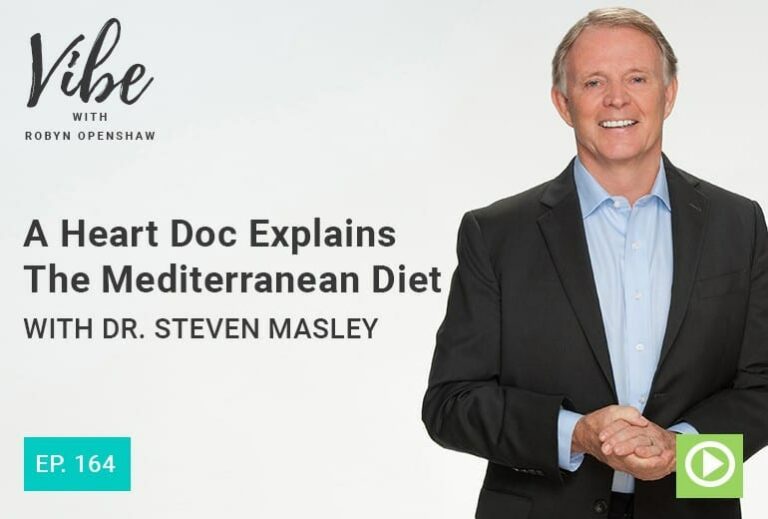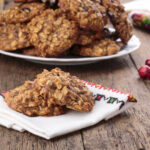Ep. 164: A Heart Doc Explains The Mediterranean Diet with Dr. Steven Masley | Vibe Podcast

Podcast: Play in new window
US News & World Report just named the Mediterranean Diet not only the healthiest–but also the easiest to follow. Just as my friend and colleague, the semi-retired world-sailing dietician, chef, and heart doctor Steven Masley publishes a book about exactly how to do it.
LINKS AND RESOURCES:
Get the book: “The Mediterranean Method”
Enter Your Receipt Details and Get the Mediterranean Method Cooking Class Videos
Learn more about Dr. Masley
Sign up to receive the Mediterranean Method Essential Tools and Pantry List
EPISODE HIGHLIGHTS WITH Dr. Steven Masley:
- [05:32] The Number One Diet. The U.S. News & World Report rates one particular diet as number one is several intriguing aspects.
- [07:24] The Key Ingredients. What are the main foods and who can take part in the diet?
- [08:41] Fat: A Study. Listen to learn the differences between the Mediterranean diet and low-fat diets.
- [18:51] Mediterranean Myths. Dr. Masley explains the most common myths about his favorite diet.
- [21:36] Diet or Lifestyle? Dr. Masley explains the lifestyle and cultures behind the diet, and why it works so well.
TRANSCRIPT:
This transcript has been edited for clarity. Robyn: Hey, everyone. It’s Robyn Openshaw. Welcome back to the Vibe show. It’s January here in Park City, Utah, and it is very, very cold. We are going to try cross country skiing tomorrow for the first time. We’ve been doing a lot of downhill skiing and have played a little bit of pickleball. Have you heard of pickleball or have you played it? It’s super fun. We’ve played it with friends and family, and while the kids were here from college break, we played a little bit. I have my high school friends coming in for a little mini reunion at the end of January here. [I am] gearing up for that. I’m going have a whole bunch of [people] in my house. We’re literally buying those blow up mattresses for the floor because [there will be] too many people to fit in my house. [We are] busy for a cold January in Utah. Meantime, a dear friend of mine, Dr. Steven Masley is a medical doctor — [a] cardiologist. He just came out with a new book, and the timing is really, really great because the Mediterranean diet is getting so much press, and I want you to know a little bit more about what the Mediterranean diet is as he talks to us about his new book. He’s a medical doctor, a nutritionist, and a trained chef. I think I’ve had him on the show once before, but he’s a fellow with the American Heart Association and with the American College of Nutrition. He just sold his clinic, and he and his wife are really traveling all over the world — and in fact the Mediterranean — studying food and studying what people eat. Also just enjoying their semi-retirement. So his previous books have been about how lifestyle choices affect brain function and heart health and aging. He’s written books like the Better Brain Solution, The 30 Day Heart Tune Up, 10 Years Younger. Another of his books is called Smart Fat, and he’s also published extensively in the medical journals. I am looking forward to getting on his boat pretty soon. We keep talking about it for about the last year and a half, but I think it’s really going to happen this summer. He is a clinical associate professor with University of South Florida, and Dr. Steven Masley and his wife split their time between there close by in St. Petersburg, Florida and, of course, sailing on their boat in the Mediterranean. Welcome back to the Vibe show Dr. Steven Masley. Dr. Masley: Yeah, I’m delighted to be back with you, Robyn. Robyn: How long you been off the sailboat? Dr. Masley: We’ve been home for three months, and it was an amazing trip. It’s been great. I’m really lucky. I’m really excited about the book coming out. It’s like having a baby and helping this baby launch into the world and make a big difference. It’s going to really be great. Robyn: Did you work on your book while you’re out sailing for weeks or months at a time? Dr. Masley: Absolutely. I did most of the intense research before we left. I literally tried to download, research, and read about a thousand scientific articles on health aspects of the Mediterranean diet. I did quite a bit of the writing and the recipe testing. A lot of the recipe testing happened on the boat. Robyn: I know you and I are getting on the phone next week to talk about a different issue of which of your sailboat excursions John and I are going to come out with you on. We’re very excited about it. We’ve been talking about it. Where’s the last place that you sailed and where’s the next place you’re going? Dr. Masley: The last place we were was in Greece, looking at Greek recipes and Greek culture. We left our boat there, and when we head back, we will be in Greece, but the first thing we do is literally sail to Turkey and go down the Turkey Turquoise Coast looking at Turkish culture, recipes, and, of course, having some fun. Robyn: Nobody is more qualified to write a book about the Mediterranean diet than you. I mean, not only are you a heart doctor and a chef, but you also are literally sailing around the Mediterranean, learning everything you can about food. This is going to be exciting. Right before I was going to interview you and right before your book on the Mediterranean diet came out, I saw that one of these organizations — you’ll have to remind me who it was — but I saw one these organizations that ranks all the diets (and of course keto diet was dead last, and I’ve over talked about that with my audience because I’m really worried that people are going to go over eat fats and so I’ve done that one to death.). Good timing for your book. I don’t know if you paid them off or what, [but] number one was the Mediterranean diet. Talk about that. Dr. Masley: Yeah, the U.S. News & World Report rated the Mediterranean diet as number one for the overall diet — number one for a healthy diet, number one for plant-based diet, number one for diabetes diet, and the number one easiest diet to follow. That’s amazing that the diet that’s easiest to follow turns out to be the best for your health. Something they didn’t rate was how delicious the food was. If they’d rated delicious, I’m sure it would have rated number one for delicious too because you’ve got this amazing combination of Spanish, French, Italian, Greek, Northern African, [and] Turkish dishes. I mean it’s such an amazing combo. Robyn: I think you’re making a really good point that it’s really versatile, and there’s just so much you can do with it. I think people should know what your diet is. You didn’t just decide to go plant-based. First of all, I’m really frustrated with what’s happened to the word plant-based. People who literally eat 50% animal products are calling themselves plant-based because they eat a vegetable or two here. I believe — you can correct me if I’m wrong — I believe that you and Nicole, at least you, have been vegan for decades. Am I wrong? Dr. Masley: I think I was vegan for 10 years, and I do eat seafood now, so I’m not vegan or vegetarian anymore. Pesco-vegetarian I guess would be the best way to describe me. Some people eat poultry. I put poultry in [the book’s recipes]. To be plant-based, at least 80%, preferably 90%, of what you eat should be plant-based. That’s how I look at it. 50% would be kind of a joke to call that plant-based. It doesn’t come near enough. The key foods in the Mediterranean diet that I have people add every day are vegetable, fruit, beans, nuts, extra Virgin olive oil. They get to spice it with lots of herbs and spices, and they can drink some red wine, and they can have some tea and coffee. Those are the everyday foods that are essential to the Mediterranean diet. I think it really is a plant-based diet. You could be vegetarian and follow this. You could be vegan and follow it. You would end up having some occasional poultry, seafood and dairy. Those are already central parts of it. Robyn: It’s the most studied diet. You’ll have to tell me what you think. How many studies there are underpinning how healthy the Mediterranean diet is and how low disease risk it is for people who follow it for many years? Tell us about that. Why isn’t everybody in America eating the Mediterranean diet? Dr. Masley: The U.S. News & World Report thinks we all should be, and the World Health Organization. This international group has said that everybody on the planet should be following the Mediterranean diet for the health benefits. We know that when they’ve done randomized trials and they compare the low-fat diet with the Mediterranean diet, people had less heart attack, less stroke, and less cardiovascular events overall. It was better. When they compare the low-fat diet to a Mediterranean diet, the Mediterranean people diet had their cognitive brain function improved. They got mentally sharper and quicker. T. Those on the low-fat diet actually had an accelerated rate of memory loss and cognitive decline to the point they had a higher percentage of people develop Alzheimer’s disease in less than five years. Robyn: Some of the vegan authors especially those who are treating heart disease, I’m thinking gosh, McDougall, Fuhrman, Ornish. Yup. They’ve been putting people on a very low fat diet. Are you saying they’re on the right track, but higher fat even for people with cardiac disease? Dr. Masley: Yeah. Well, here’s what I would say. I think those diets are clearly better than the standard average American diet, which has terrible fats in it, terrible carbs and awful protein. I mean, the standard American diet is the worst diet of all time. Compared to that, these ultra low-fat vegetarian diets are clearly better. I think that the evidence is adding more healthy fat, olive oils, and nuts to a vegetarian diet improves. It improves cognitive performance, improves cardiac outcomes. You don’t have to be on an ultra low-fat version of these to benefit. I actually think that the evidence is very strong that healthy fat is good for you. Robyn: Okay. I think it’s Dr. McDougall, but I want to say Dr. Esselstyn says the same thing that oils specifically, not the fats and nuts and seeds, but oils — like extracted oils — will damage the epithelial lining. People specifically with heart disease should avoid oils. You’ve been treating heart patients for decades yourself. Dr. Masley: That’s just not accurate. When you think of endothelial function, you think of blood pressure, and when you give people extra Virgin olive oil, their blood pressure improves. We decrease cardiovascular events when we add olive oil. Many oils are really damaged. I’m not suggesting any oil. I don’t even suggest regular olive oil because it’s been processed with chemicals and treated with heat, and it’s a damaged oil. If you’re going to use olive oil, I would only suggest extra Virgin olive oil. There’s a little truth to the fact that it’s hard to find the right type. If it’s cheap and comes in a plastic bottle, it’s probably not the real thing. Robyn: I think people are concerned about this because there’s been so much media lately about how a lot of what is masquerading as olive oil out there is actually cut with canola oil. I have an employee who has an allergic reaction to canola oil. If I were guessing at brands, I’d just send it to Zoe and have her be like the Queen’s taster or whatever, but that wouldn’t be very nice if it actually ended up having canola oil in it. How do you go about [finding the right olive oil] if you’re here on the mainland? We’re not sailing the Mediterranean finding these amazing brands that you probably have access to because you’re actually in Europe a lot. How do we know? How do we know which brand to trust? Dr. Masley: You mean like the extra Virgin olive oil from California? There’s a whole group that is certified. It’s California certified as original organic extra Virgin olive oil. They do have certification that it’s not been cut and it’s been tested. You can get that stamp of approval on it, “Produced in California,” for example. Other places in Australia are following that similar trend so you can find it out there. I think partly it’s just some common sense. When you see in a big plastic bottle olive oil that’s really cheap, you shouldn’t wonder, “Is this really the good stuff?” I think it’s worthwhile to look for certification, when they’re freshly pressed, and things like that. They taste better too. Olive oil goes bad over time. There’s several things about the harvest date. Is it certified? Most important is not to cook with it at high heat. Just use low heat or medium heat, and if you want to cook something at high heat, you should use avocado oil or almond oil or a different oil instead. Those are, to me, the most important things to know about extra Virgin olive oil. Robyn: You took the standard Mediterranean diet and your book, the Mediterranean Method — coming out right now — you made it friendly for people wanting to lose weight and for heart health. What tweaks did you make? Tell us about that. Dr. Masley: In studies, they looked at the Mediterranean diet and they broke it down into glycemic load. [For example,] how much sugar do you get in your diet while following the Mediterranean diet? What they found was the lower the glycemic load and following a Mediterranean diet together produced the best results. That was a big part of my better brain solution to improve brain function was to lower sugar load because sugar is the number one cause for heart disease. It’s the number one cause for memory loss. We don’t want foods that cause our sugar levels to soar. What that means is most of these Mediterranean cookbooks out there, they are loaded with huge portions of pasta, rice, bread, pizza. That’s a very high glycemic load, and that’s not a healthy way to eat Mediterranean food. As an example, if you eat pasta in Italy, it’s an appetizer course on a little salad plate. It’s not a big dinner platter that each person eats. That’s like crazy. It’s really about addressing a lower portion size of high-glycemic load foods, especially bread or rice or pasta or things like that and eating them in small portions and really focusing on vegetable, fruit, beans, nuts, olive oil, spices and herbs. Those are the critical things we need to eat more of, not the sugary starchy carbs. Robyn: Okay. We do have to point out, though, that it’s been very popular this last decade to talk about low-carb, and the Mediterranean diet is not that. Talk about that. Dr. Masley: There’s a difference between low-carb and low-glycemic. [The difference between low-carb and low-glycemic is just like the difference] between low fat and smart fat. A smart fat diet is you eat more avocado and you eat more nuts and you use olive oil when you cook or you cook with avocado oil, but you’re not eating bad fats. Just like that. If you’re going to eat more carbs, I encourage vegetables and fruits and beans and nuts. Those are good healthy carbs sources. We should eat more of them. I think to get the best outcome from eating those, you would like smaller portions of the really high glycemic load foods like anything with flour — crackers, breakfast cereal, bread. That’s a high sugar load food. You don’t want to eat that in a large portion. It doesn’t physiologically make sense. It’s not good for our health. I think most of the Mediterranean cookbooks way overdo the carb load, the glycemic load, and it’s unbalanced. I have a low glycemic version of a Mediterranean diet that has the best health benefits, but the food is still delicious, and it’s still super easy to prepare with easy recipes. Robyn: You started eating seafood. Is that related to the fact that most people, even those who are supportive of vegan diet, feel like you need more protein over 60? Dr. Masley: For me, on a personal level, what it was is for a while I was testing positive for gluten. I think it was a challenge to be gluten free personally. Some people could probably do it easily, but I found it challenging to be gluten free and to be vegetarian at the same time. Robyn: I totally agree. People don’t talk about that. Right now, legumes and grains are definitely out of Vogue, which make a huge appearance in the Mediterranean diet. If you’re going to get rid of legumes and grains, to get enough calories you’re not going to be able to also be vegan. Right? Dr. Masley: It was a challenge. It wasn’t that I couldn’t do it. Both my parents have had a lot of arthritis and always had inflammatory joint issues. Now that I’m 64 — I’m a young guy at 64 — but I noticed I have some arthritis, and adding seafood or fish oil for me really has made a difference in decreasing my inflammation levels. I have personally benefited by adding these long chain Omega-3’s. Maybe I could’ve tried doing it with some DHA algae supplements — that’s possible. [For] other people, if they really want to be vegetarian, I still recommend they should be eating seaweed every day as their seafood source or taking a DHA supplement. For me, just lifestyle wise and having a family and kids and all that, it just seemed the easiest way to add seafood to my life. That’s what happened for me on a personal level. Robyn: Okay. What are some of the things that people think about the Mediterranean diet that aren’t true? Dr. Masley: [People think the diet contains] uncontrolled grain portions, like pasta and bread and rice. We’ve already been talking about that. That’s not true. Another common myth is about extra Virgin olive oil. [They think] you can cook with it for everything, and use it as your only fat source. Well, as I’ve mentioned, you shouldn’t cook with it at high heat, so that’s not true either. Another one is that you can just add olive oil to everything and that makes it good enough. It’s healthy. Like you can put olive oil on your cornflakes and, well no. [Laughter]. I mean olive oil, yes, is an oil we should use, but the key benefits are vegetable, fruit, beans and nuts. Those are the key components, and you can’t leave out vegetable fruit, beans and nuts and think it’s going to be a healthy diet because those are big important parts of the Mediterranean diet. Dr. Masley: Just one other example of a myth is red wine. Yes, with the Mediterranean lifestyle, you end up drinking a glass or two of red wine with dinner. That’s just a normal everyday habit, and it’s beneficial in that amount. Some people are like, “That means I get to have a bottle or two or a day. Right?” No, no, no. If you are on a cardiac drug, and they’d said, “Take one a day,” would you take four? No, it might cause real harm and excess red wine is too much. You should drink a lot of water and a little bit of red wine. Those would just be examples of four common Mediterranean myths that I think everybody should know. Robyn: What about white wine — higher in sugars, lower in micronutrients or what? Dr. Masley: It’s certainly lower in nutrients. When we look at all alcohol, one serving a day of hard liquor or beer increases your risk of cancer. Wine doesn’t as much and red wine less than white wine. Red wine has more nutrient polyphenols and all of these important chemicals that have health benefits. Red wine is clearly [the healthier alcohol] if you drink alcohol. There are people who probably shouldn’t. If you can’t limit your amount to a modest intake every day, then don’t drink. I don’t think everybody should drink alcohol because not everyone can control their consumption. [Consume] one to two servings a day or skip it and drink more water and herbal teas. That’s a really good Mediterranean idea. Most things you don’t get an excess, especially when it comes to alcohol. Robyn: Besides the food that people are eating in the Mediterranean, who are actually eating true to their culture and heritage, what else do they have going for them that causes them to live longer and have much, much less disease than we do over here in the U.S.? Dr. Masley: That’s a really good question because before I went on the boat, I read about this. Being on the boat, here’s the things I could see. People are out walking, jogging, going around every day. People grocery shop, they walk to the grocery store almost every day or every other day. They are far more active than we are. They’re not only outside walking, but they’re jogging, they’re swimming, they’re bicycling. They’re much more likely to go and workout outside with nature than they are to go to a gym, which is very different than the culture in the U.S. Activity is one. Two is that they tend to cook and shop in groups or together. Camaraderie. The neighbors will go shopping together, and they’ll cook together, and there’s this social interaction all around food that has nothing to do with eating it. When they do eat, the meals are long and leisurely. In seven months, honestly I don’t think Nicole and I ever went out to eat in less than 75 to 90 minutes. Never. You couldn’t get served in that amount of time and leave. It’s not fast food. They have a long leisurely lunch and dinner with people almost every day. They don’t eat in front of a computer or the TV or with their phone. They talk and they taste their food. They have very mindful eating. It’s interesting. They have all this social interaction every day, especially with family. They have much lower rates of depression and anxiety than we do. I think there’s a lot we could learn about a Mediterranean lifestyle that we need to adapt — not just the food. The food is fabulous, but there’s several things about the lifestyle that have added benefits and I can’t wait for you and John to see those on the boat. Robyn: I think we’re going to come right after my Swiss retreat. I’m doing two this year and the first one ends June 7th, so I’m definitely thinking about that leg of your journey and joining you. You’re talking about how while people eat, they also socialize, and they really take their time eating a meal. [That] reminds me of every time I go to Switzerland — I’m going twice this year. I go again in October — and every time I go, I have to tell people on Friday night after we do our liver flush, “The gala dinner is an event,” and you have to tell Americans that because otherwise they’re like, “The soup was served 20 minutes ago. Are they ever going to get our next course out?” I tell them, “Listen, dinner’s going to take two and a half hours. It really is. Settle in for a European experience.” This is how I get my North American liver detoxers to set aside what they think a meal is and what they think healthcare is and what they think about a lot of things. I like [to] tell them in advance. Don’t be in a hurry for this meal. The point isn’t the food. The point is the experience and getting to know each other. That’s one of my favorite things about going to Switzerland is that we sit together at lunch, and sometimes when lunch is over, we’re still sitting there at the table for another hour until somebody has to leave for their treatments. I do love that. Sue, my podcast producer, who’s always here with me — if I’m talking on this podcast, she’s my backbone. She produces it. She helps me with the show notes — she and I have been talking about the very real phenomenon that is American loneliness and how we are set up to be so socially isolated. [We are] exposed to so many people online and not that meaningful energy exchange that happens one-to-one. I’m excited to hang out with you. Hopefully this is the year that we actually make that happen. It’s quite a thing. I think I have to fly to Crete or something and I’m like, do they have a runway long enough in Crete? I’m kidding. Tell us about the recipes. Let’s leave on the food note. Tell us about what kind of recipes you developed. Dr. Masley: I’d love to go to the recipes, but I want to comment on what you just said. [The] difference is when I look at people eating in a restaurant here in the U.S. compared to in Europe or on the Mediterranean, in the Mediterranean, you see them talking about the food and laughing and joking and they’re having this leisurely, wonderful conversation. When I look at people eating in a restaurant in the U.S. it almost seems like half the time they’re not even interacting, and they’re on their phones. That’s lonely. [Laughter] That’s a lonely meal out in a restaurant with another person that you’re not even talking to. When you said that it just brought that visual image to my mind. I just had to share it. I mean we could do a lot better at being social and interactive and have leisurely fun meals here. I think it would really go a long ways. Right. I just wanted to hammer that home because I think you made a really important point, and I didn’t want us to miss that chance. Recipes. I love the recipes in this book. Here’s the biggest thing. They’re pretty easy to prepare. They’re not elaborate, multiple cooking steps. When I go to the market and I’m buying something, I ask, What’s good and fresh? How would you make this?” They always say, “Keep it simple.” You get a couple of spices, a little olive oil, you sauté, you cook it, you do this, you freshen it with a little bit of dressing. It’s colorful, it’s flavorful, it’s easy to prepare, and it’s delicious. Don’t make it too complicated is something they always say. Robyn: I love that. I’m going to read some of the recipes. Grilled asparagus with olive oil and lemon; roasted beet, leek and kale salad; sautéed kale with garlic and lemon zest; za’atar sautéed fennel and spinach with farro. I’d bet most people listening don’t know za’atar or farro is. Dr. Masley: It’s a blend of Eastern spices and some Sesame seed. It’s a wonderful Eastern Mediterranean spice combo. Robyn: Gigantes. Gigantes are fava beans. Yeah. Dr. Masley: Yes. Big. Those are so popular to have beans as a side dish. I’d say every day there’s a bean as a side dish. Beans served when we’re out eating. They lots of beans. They do it with tomato sauce, they do it with garlic and parsley and olive oil. Coming to the classics, the vegetable dishes are so simple. Swiss chard, kale, spinach, anything, you cook it with a little olive oil. You add a touch of salt and pepper, a little lemon juice and maybe some little herbal spice like thyme or oregano or Rosemary. It’s usually five to 10 minutes. Simple, easy, super flavorful. These classic combos you see over and over again. Robyn: Hmm. Yummy. I’m going to try this. Ratatouille with cannellini beans. This looks delicious. Dr. Masley: It is. Robyn: What’s your favorite thing to cook? Like desserts or…? Dr. Masley: It’s probably dinner. Dessert in Europe is really [different]. Most of the time we get dessert in a restaurant. It’s free. They give you fruit. If you order an appetizer, a main course, and glass of wine, automatically, 90% of the time they’ll give you melon or grapes or berries or something at the end of your meal. I mean they have fancy desserts, but dessert in Europe usually means fruit. You have fruit after your meal and you do it while you’re still sitting. You don’t grab an apple and eat it while you’re walking away. You’re still sitting with people and you eat it with a knife and fork. It always comes sliced or something like that. I really liked this combination of flavors. They use the garlic, the Mediterranean herbs, Italian herbs or herbs de Province. There’s so many great combos that are there. Just think about something really easy like green beans or kale or spinach. How do you make them taste awesome and you can still prepare them in five to 10 minutes so that people are just like wanting to eat more of that. To me, Mediterranean cooking is all about simple and fantastic, and the fact that it’s the healthiest diet on the planet, that’s just a bonus. Robyn: So true. Now everyone’s hungry listening to the two of us talking about food. The book is called the Mediterranean Method. I’m going to start using some of these recipes because one of my new year’s resolutions for 2020 is to cook more. I realized I cooked so much. I raised four kids, and the youngest one’s 19. He’s gone now. I had not been cooking because there’s no one to appreciate it. The thing is that I have an appreciative partner who loves what I make and is open-minded and will eat what I feed him and do the dishes. I’m totally on it for 2020. It’s called the Mediterranean Method: Your Complete Plan to Harness the Power of the Healthiest Diet on the Planet — Lose Weight, Prevent Heart Disease and More. Dr. Steven Masley tell us where they can find you to follow you. Learn more. Maybe just mention a few of your other books. Dr. Masley: For more they can always go to the website, drmasley.com D R M A S L E Y .com. All one word. I always have a bonus for signing up right now. If they follow on the website, I have a “How to Get Started on a Mediterranean Diet” quick guide that you could have for all your followers. It gives them a list of what you need in the kitchen and what you should put in your pantry to get started. That’s my best source. I have a blog. I have free recipes and I share them regularly. Other books besides the Mediterranean Method, probably the two favorites were The 30 Day Heart Tune Up and The Better Brain Solution are really complimentary to the Mediterranean Method. Robyn: I love it. We will get the link for that guide for what you need in your kitchen if you’re going to adopt a more Mediterranean diet. We’ll get that and we’ll put it in the show notes. Thanks so much for being with us today, Steven. Dr. Masley: Oh, thank you, Robyn. It’s always a pleasure to get to talk with you. Mediterranean Diet voted rated number one
Mediterranean Diet and Low-Fat Diet
Mediterranean Diet and Myths
Some Dr. Masley’s Mediterranean Diet Recipes
Mediterranean Diet and Dessert













